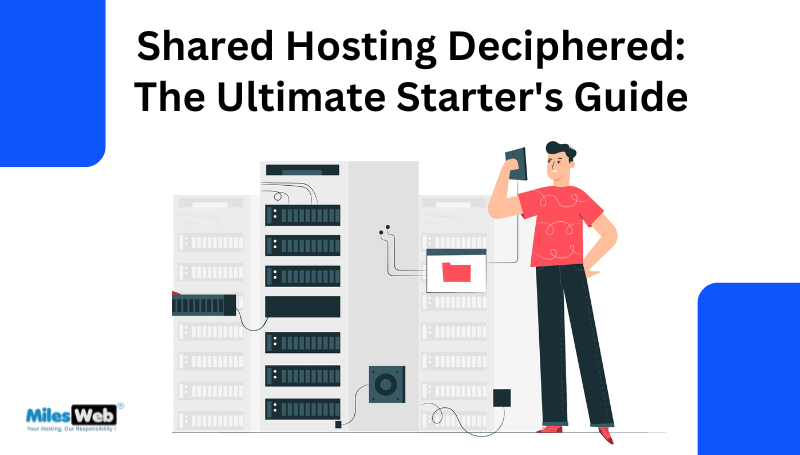
Shared Hosting Deciphered: The Ultimate Starter’s Guide
A website has become a necessity in today’s digital age. A website serves as your online home base, no matter if you’re a budding entrepreneur, a passionate blogger, or you simply want to establish your online presence. But before you dive into the interesting global world of website introduction, you may want a basis: web website hosting.
This complete guide delves into the sector of shared NVMe SSD hosting, the most common and budget-friendly option for novices. This blog will help you break down the technical jargon, discover the advantages and drawbacks, and equip you with the know-how to make an informed choice based on your website’s requirements and your shared hosting demands.
Web Hosting: Overview
A website consists of content, including textual content, photographs, videos, and more. And to make all this data stored and available, your website requires a virtual space to live online. This virtual place is furnished using a web hosting service. A web hosting provider offers various hosting solutions, plans, types, and tools to host your website, each catering to the required business demands and budgets. Shared web hosting is one of the most popular alternatives, especially for beginners, because of its affordability and ease of use.
Understanding Shared Hosting
Shared web hosting, as the name indicates, is all about sharing server resources with more than one website. Think of it like a condo constructed with numerous tenants who share common areas like hallways and laundry facilities. While each website has its own space, the underlying server infrastructure is shared among all websites hosted on the server.
This simply means that in shared hosting, you get your website’s files and folders separated while the major infrastructure, including CPU, RAM, and storage, is limited among all the websites hosted on that single physical server.
This shared environment is a powerful solution, optimal for websites with low to mid-traffic levels. Web hosting providers address server protection and safety, allowing users to focus on growing and handling their websites smoothly.
Benefits of Shared Hosting
Affordability:
Shared website hosting is the most financially viable alternative. With it, users can start their hosting journey in less time and with a minimum budget.
Ease of Use:
Shared hosting platforms are typically user-first-rate, with beginner-friendly control panels and one-click installations for diverse applications. This makes it easy to host your website with less technical knowledge.
Maintenance-Free:
The web hosting provider manages the server infrastructure, along with safety updates and upkeep. This frees up time and resources to pay attention to your website’s growth.
Scalability:
Many shared hosting providers have high-tiered plans with extended beneficial resource allocations. As your website grows, you can enhance your shared hosting plan. This minimizes the need for upgraded hosting.
Wide Availability:
Shared web hosting is easily available from an exquisite array of hosting companies, with numerous features and plans to pick from.
Considering the Limitations of Shared Hosting
While shared website hosting offers several benefits, it’s also essential to note the downsides of it before making an informed decision.
Resource Sharing:
Since resources are shared, if any other website experiences a traffic surge, your website will too have to handle the downtime issues. This happens because the website’s performance is impacted by other websites experiencing surges in traffic.
Limited Control:
With shared servers, you have less control over configurations, resources, and customizations in comparison to dedicated or VPS hosting options.
Security Concerns:
While protection is a concern for web hosting companies, a safety breach on one website will probably affect others sharing the server.
Scalability Limitations:
Shared website hosting is not appropriate for websites with extremely excessive visitor rates or heavy resource requirements. As your website scales, ultimately, you need to migrate to an improved solution like VPS or cloud hosting.
Factors to Consider While Choosing the Right Shared Hosting Provider:
There are many shared website hosting companies to choose from, so choosing the right one is crucial. Here are a few key elements to remember while making the ultimate decision:
Reputation and Reviews:
Research a reliable hosting provider and check online reviews to get more details about user satisfaction rates.
Features and Pricing:
Compare the tools, resources, and features offered by the shared hosting provider and verify whether you get storage, bandwidth allocation, email accounts, and database support. Ensure the plans align with your website’s needs and your price range.
Uptime Guarantee:
Look for a company that offers an excessive uptime guarantee. Aim for at least 99.9% uptime to ensure minimal downtime.
Customer Support:
Reliable and responsive customer support is essential. Evaluate their response times and expertise in handling your concerns.
The Verdict
While shared web hosting is a great place to begin, offering a few scalability options with tiered plans, take into account if the provider offers other essentials. You should get the industry-grade and basic features to have effortless hosting.
Moreover, if your current needs are minimal with limited visitor rates and storage needs, shared hosting is the best solution for you!
Let’s get in touch
Get a risk-free, no obligation proposal in 1 business day or less.
